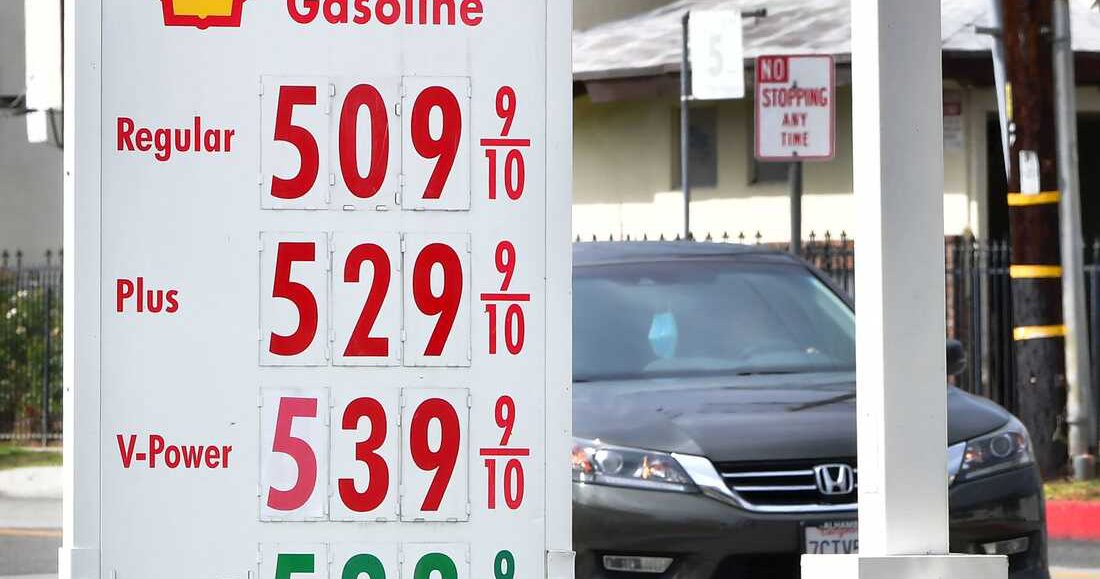U.S. gas prices hit an all-time record Tuesday, and experts don't expect the pain at the pump to ease any time soon.
The average price for regular gas in the U.S. was $4.37 per gallon on Tuesday, according to AAA. Diesel prices also hit a record $5.55 per gallon.
Tuesday's price beats the previous record set in early March, after Russia launched its invasion of Ukraine. Adjusted for inflation, however, gas prices have yet to surpass the 2008 record, which would be more than $5 per gallon today.
The rising prices at the pump are compounding inflationary pressures for U.S. consumers. Inflation rates hit a 40-year high in March after the consumer price index jumped 8.5% annually.
“We should get used to higher gasoline prices,” Matt Smith, an analyst with data analytics firm Kpler, told USA TODAY. “We shouldn’t expect to see them dropping back to $2 a gallon. Those times seem to have passed.”
When will gas prices go down?
Benchmark oil prices have taken a "significant hit" recently, which could lead to lower gas prices next week, according to AAA spokesperson Devin Gladden. West Texas Intermediate crude settled at $99.76 a barrel on Tuesday, down 3.2% from the day prior.
But in the long run, prices aren’t expected to ease back to pre-pandemic levels any time soon.
“There’s little, if any, good news about fuel prices heading into summer," Patrick De Haan, head of petroleum analysis at GasBuddy, said in a Tuesday news release.
De Haan added that prices "could become worse" if hurricane season, which starts next month in the Atlantic, hurts refinery capacity.
$5 per gallon is possible
Smith of Kpler said prices will likely continue to hold above $4 per gallon, and noted that $5 per gallon is “by no means beyond the realms of possibility.”
“Gasoline prices will remain high as long as oil prices remain in the triple digits,” he said. “It’s going to hit the pocketbook far harder.”
Claudio Galimberti, senior vice president of analysis at research company Rystad Energy, said demand is keeping gas prices high, but that could change if inflationary pressures worsen.
"Even at these elevated levels, prices are somewhat sustainable. The problem that I see, really, is the inflation," he said. "That can actually decrease demand and eventually prices."
Why do gas prices keep going up?
Crude oil prices began to spike last week after the European Union signaled that it was looking to sanction Russian oil. In response, West Texas Intermediate prices at times soared past $110 as the market factored in the risk of oil supplies tightening further.
“We haven't seen oil prices that high since Russia first invaded Ukraine,” AAA's Gladden said. “And so as a result of last week's crude price increases, we're now seeing pump prices follow suit this week.”
De Haan said gasoline and diesel prices are "spiraling out of control" as demand continues to outpace supply.
"Liquid fuels have turned into liquid gold," he said in the release. "Russia’s oil increasingly remains out of the market, crimping supply while demand rebounds ahead of the summer driving season.”
Where are the highest gas prices in the US?
Here are the highest regular gas prices per gallon in the U.S. as of Tuesday, per AAA:
-California: $5.84
-Hawaii: $5.30
-Nevada: $5.13
-Washington: $4.87
-Oregon: $4.85
-Alaska: $4.77
-Washington, D.C.: $4.71
-Illinois: $4.69
-Arizona: $4.67
-New York: $4.57






